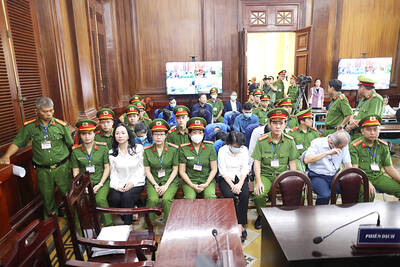An 11th-hour deal clinched by German Chancellor Angela Merkel to rescue her fragile government by limiting migrant arrivals immediately ran into European resistance yesterday, with neighboring Austria vowing to “protect” its borders.
In high-stakes crisis talks overnight, Merkel put to rest for now a dangerous row with a longtime rival, German Minister of the Interior Horst Seehofer, that had threatened the survival of her shaky 100-day-old coalition.
A relieved-looking Merkel, who has been in power since 2005, emerged from the late-night negotiations hailing a “very good compromise” that would “control” new arrivals of migrants and asylum seekers while upholding EU cooperation and values.
However, criticism from Vienna and her junior coalition partner, the Social Democratic Party (SPD), threatened to throw a spanner in the works just as Germany hoped to emerge from a crippling weeks-long political standstill.
If the agreement reached on Monday evening is approved by the German government as a whole, “we will be obliged to take measures to avoid disadvantages for Austria and its people,” the Austrian government said in a statement.
It added it would be “ready to take measures to protect our southern borders in particular,” those with Italy and Slovenia.
The remarks raised the specter of a domino effect in Europe, with member states taking increasingly restrictive measures to shut out refugees.
Under the pact both sides hailed as a victory, Merkel and Seehofer agreed to tighten border controls and set up closed “transit centers” to allow the speedy processing of asylum seekers and the repatriation of those who are rejected.
Those who are rejected would either be sent back to EU countries that previously registered them or, in case arrival countries reject this — likely including frontline state Italy — be sent back to Austria, pending a now questionable agreement with Vienna.
Christian Social Union General Secretary Markus Blume called the hardening policy proposal the last building block “in a turnaround on asylum policy” after a mass influx brought more than 1 million migrants and refugees.
However, doubts were voiced quickly by other parties and groups, accusing Merkel of bidding a final farewell to her welcoming stance toward asylum seekers taken at the height of the influx in 2015.
Refugee support group Pro Asyl slammed what it labeled “detention centers in no-man’s land” and charged that German power politics were being played out “on the backs of those in need of protection.”
Annalena Baerbock of the opposition Greens party spoke of “internment camps,” accusing the conservatives of “bidding goodbye to our country’s moral compass.”
She urged the SPD to reject the plan.
SPD leader Andrea Nahles said after a party meeting yesterday that it still had “has significant questions” on the deal.
The Social Democrats are to hold joint party meeting with the CDU/CSU bloc at 4pm yesterday.
“We will take the time we need to take a decision,” she said.
One of the SPD’s migration experts, Aziz Bozkurt, was withering, charging that the proposed holding centers would be “impractical and fully on track with the AfD” — the far-right Alternative for Germany party that has railed most loudly against immigrants.
The deal announced overnight ended Merkel’s worst crisis after she faced down an unprecedented mutiny by Seehofer, head of her party’s traditional allies the CSU.
A failure to defuse the open conflict would have threatened an end to their 70-year party alliance, forcing Merkel to find new partners or call fresh elections.

Republican US lawmakers on Friday criticized US President Joe Biden’s administration after sanctioned Chinese telecoms equipment giant Huawei unveiled a laptop this week powered by an Intel artificial intelligence (AI) chip. The US placed Huawei on a trade restriction list in 2019 for contravening Iran sanctions, part of a broader effort to hobble Beijing’s technological advances. Placement on the list means the company’s suppliers have to seek a special, difficult-to-obtain license before shipping to it. One such license, issued by then-US president Donald Trump’s administration, has allowed Intel to ship central processors to Huawei for use in laptops since 2020. China hardliners

A top Vietnamese property tycoon was on Thursday sentenced to death in one of the biggest corruption cases in history, with an estimated US$27 billion in damages. A panel of three hand-picked jurors and two judges rejected all defense arguments by Truong My Lan, chair of major developer Van Thinh Phat, who was found guilty of swindling cash from Saigon Commercial Bank (SCB) over a decade. “The defendant’s actions ... eroded people’s trust in the leadership of the [Communist] Party and state,” read the verdict at the trial in Ho Chi Minh City. After the five-week trial, 85 others were also sentenced on

Conjoined twins Lori and George Schappell, who pursued separate careers, interests and relationships during lives that defied medical expectations, died this month in Pennsylvania, funeral home officials said. They were 62. The twins, listed by Guinness World Records as the oldest living conjoined twins, died on April 7 at the Hospital of the University of Pennsylvania, obituaries posted by Leibensperger Funeral Homes of Hamburg said. The cause of death was not detailed. “When we were born, the doctors didn’t think we’d make 30, but we proved them wrong,” Lori said in an interview when they turned 50, the Philadelphia Inquirer reported. The

RAMPAGE: A Palestinian man was left dead after dozens of Israeli settlers searching for a missing 14-year-old boy stormed a village in the Israeli-occupied West Bank US President Joe Biden on Friday said he expected Iran to attack Israel “sooner, rather than later” and warned Tehran not to proceed. Asked by reporters about his message to Iran, Biden simply said: “Don’t,” underscoring Washington’s commitment to defend Israel. “We are devoted to the defense of Israel. We will support Israel. We will help defend Israel and Iran will not succeed,” he said. Biden said he would not divulge secure information, but said his expectation was that an attack could come “sooner, rather than later.” Israel braced on Friday for an attack by Iran or its proxies as warnings grew of